We include products in articles we think are useful for our readers. If you buy products or services through links on our website, we may earn a small commission.
Leaky Gut Diet: How to Eat to Heal Your Gut
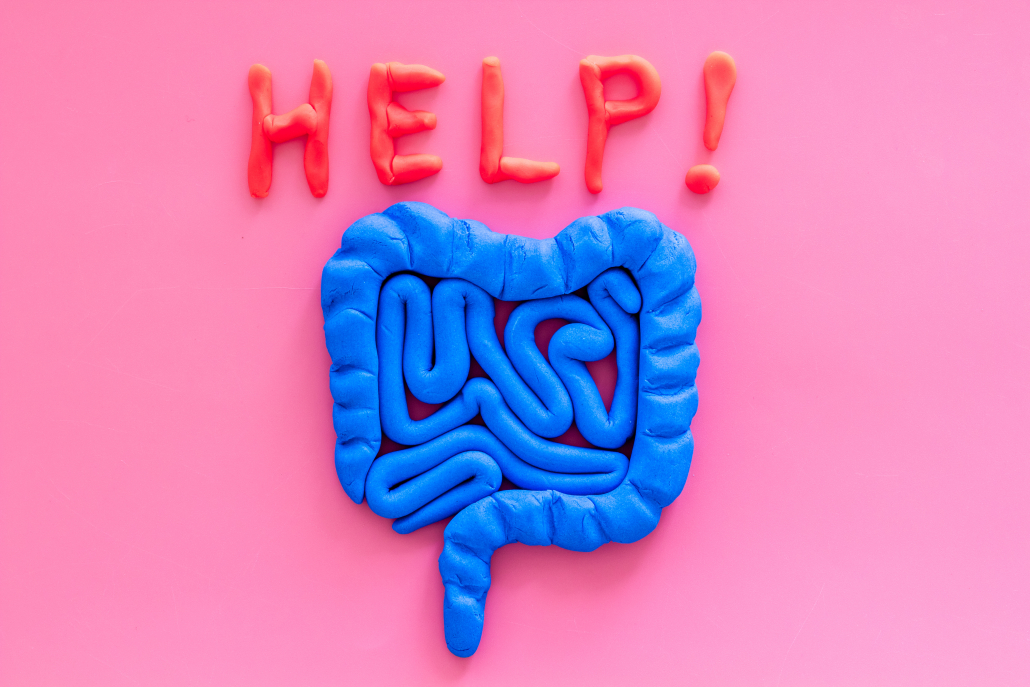
In recent years leaky gut syndrome had been identified as a possible root cause for many chronic illnesses, from skin issues to autoimmune disorders, and even cancer.
Though leaky gut is not a medical term in and of itself, it is the common name for a condition known as “increased intestinal permeability.”
Though the links between leaky gut and disease are still unclear, it has been clinically associated with various autoimmune and chronic diseases including celiac disease and type 1 diabetes.
In this article, we’ll take a closer look at what leaky gut is, its causes, and the surprising diet and lifestyle changes you can make to heal it.
Table of Contents
What is Leaky Gut?
Leaky gut is a syndrome that results from increased intestinal permeability.
But to really understand what leaky gut is, and why intestinal permeability is a big deal, you have to know a bit more about how the gut works.
Inside our bellies, we have an extensive intestinal lining covering more than 4,000 square feet of surface area. When working properly, it forms a tight barrier that controls what gets absorbed into the bloodstream.
An unhealthy gut lining may have large cracks or holes, allowing partially digested food, toxins, and bugs to penetrate the tissues beneath it. This may trigger inflammation and changes in the gut flora (normal bacteria) that could lead to problems within the digestive tract and beyond. The research world is booming today with studies showing that modifications in the intestinal bacteria and inflammation may play a role in the development of several common chronic diseases.
How the Gut Works
The gut, otherwise known as the gastrointestinal (GI) tract, processes everything you consume. It’s the conveyor belt that starts at the mouth and ends at the anus. The other organs involved are the throat, esophagus, stomach, small intestine, large intestine, and rectum.
Most of the foods and liquids you consume are not absorbed by your body until they reach the small intestine. This 20-25 foot long tube is where the nutrients we eat enter our bloodstream and are carried to fuel and support all the cells in our bodies.
The Intestinal Barrier
Your intestines comprise around 4,000 square feet of surface area, much of it protected by a lining called the intestinal barrier.
The intestinal barrier is a dynamic entity that separates the body and the gut. It requires approximately 40% of the body’s energy expenditure to maintain it. And it consists of multiple elements including:
- The lumen, where gastric acid, bile, pancreatic juice, and bacteria degrade antigens and pathogenic bacteria
- The glycocalyx and mucus layer that prevents interactions between gut bacteria and intestinal epithelial cells
- Epithelial cells connected by intercellular proteins (tight junction, adherens junction, and desmosome) that limit the entry of bacteria and/or bacterial products into systemic circulation
- The lamina propria, another defensive layer
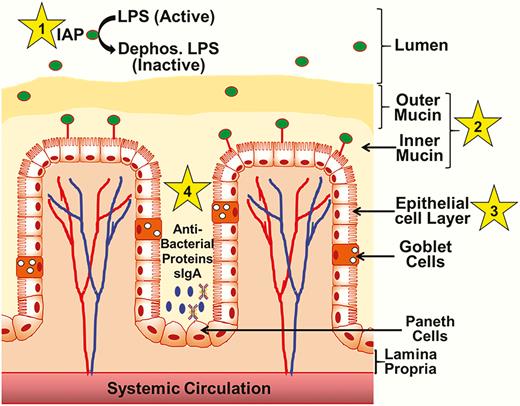
Source: academic.oup.com
What Makes the Gut Leaky?
Think of the intestinal barrier as a castle gate, with the tight junctions as the guards that open and close it after learning the identities of visitors.
Under normal circumstances, anyone considered an intruder would be kept out of the castle.
But if the guards were injured or incapacitated, intruders would be able to just walk right in. This is what happens to a leaky gut.
The case of leaky gut intruders includes harmful foreign bodies like bacteria, toxins, and undigested food particles. They’re harmful because they’re not intended to be flowing throughout your body.
And since your immune system knows that these substances are unwanted, it triggers a cascade of reactions include autoimmune responses like chronic inflammation.
Diseases Linked to Leaky Gut
Twenty-five hundred years ago, the Ancient Greek physician Hippocrates said, “All disease begins in the gut.” And it turns out, he wasn’t far off.
Physicians are finding more and more diseases — intestinal and extraintestinal — associated with leaky gut.
Why is this so?
The intestinal barrier has the critical job of maintaining homeostasis or balance, in the gut.
The gut accounts for 70% of the cells that make up your immune system, And it houses your microbiome–the trillions-strong ecosystem of bacteria tasked with crucial responsibilities from digesting food to regulating neurotransmitters and hormones.
So when the lining that maintains and balances this intricate system is jeopardized, the effects can spread to every other part of your body.
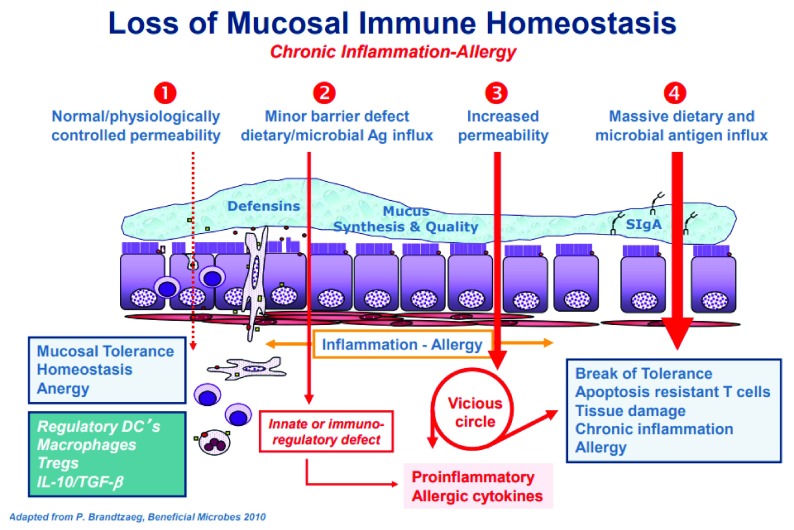
Source: ncbi.nlm.nih.gov
The following list includes diseases related to intestinal permeability.
| Intestinal | Extraintestinal |
| Gastric ulcers | Allergies |
| Infectious diarrhea | Infections (e.g., respiratory) |
| Irritable bowel syndrome; functional gastrointestinal diseases | Acute inflammation (sepsis, systemic inflammatory response syndrome, multiple organ failure) |
| Inflammatory bowel disease, Celiac disease | Chronic inflammation (e.g. arthritis) |
| Cancer (esophagus, colorectal) | Obesity-associated metabolic diseases (nonalcoholic steatohepatitis, diabetes type I and II, cardiovascular disease) |
Source: https://www.ncbi.nlm.nih.gov/pmc/articles/PMC4253991/
In addition to the above, leaky gut may be a complicating factor in:
- Autism
- Alzheimer’s disease
- Parkinson’s disease
- Asthma
- Multiple sclerosis
- Autoimmune diseases
Symptoms of Leaky Gut
Here are some signs and symptoms you can look out for that may suggest a leaky gut:
- Digestive issues (diarrhea, constipation, bloating, gas, etc.)
- Chronic fatigue
- Muscle pain or fibromyalgia-type symptoms
- Joint pain
- Headaches
- “Brain fog” or trouble concentrating
- Food allergies or sensitivities
- Skin issues, including eczema, acne, rosacea
- Autoimmune diseases
- Hormone imbalance
- Vitamin deficiency
What Causes Leaky Gut?
Physicians and researchers have so far been unable to pinpoint a direct cause of leaky gut. But there are certain factors that likely play a major role.
Plant Toxins
This one may be surprising. After all, we’ve been told for decades by doctors and other mainstream health officials — with good intentions — that we need to eat more plants.
Some of these colorful foods are also well-known “superfoods,” with claims of health benefits that range from relieving chronic inflammation to potentially curing cancer.
They look innocent enough. We can agree to disagree on taste, but we can assume most people aren’t worried about being harmed by broccoli.
But plants don’t love you. And they certainly don’t want you to eat them.
Since plants can’t move, they’ve evolved toxins and antinutrients to fend off predators. In fact, researchers estimate that we consume about 1.5 grams of natural pesticides every day or about 10,000 times more than they do synthetic ones.
Antinutrients only exacerbate the situation by causing nutritional deficiencies that lead to a leaky gut. Plant toxins and antinutrients include:
- Lectins
- Saponins
- Tannins
- Glycoalkaloids
- Glucosinolates
- Sulforaphane
- Oxalates
- Phenols
- Salicylates
- Cyanogenic glycosides
- Trypsin inhibitors
- Isoflavones and phytoestrogens
- Photosensitizers
- Omega-6 fatty acids
- Mold
All these plant toxins and antinutrients are associated with inflammation, which affects your gut health.
Lectins
Gluten may have been one of the main villains of mainstream nutrition for several years, but have you heard of its cousin lectin?
Like gluten, lectins are carbohydrate-binding proteins produced by plants to ward off predators and microbes.
Although they are found in most plants, legumes and grains have the highest amounts, followed by dairy, seafood, and plants in the nightshade family (e.g., tomatoes).
Once inside our bodies, lectins can bind to virtually all types of cells, including the cells lining your gut. These interactions can result in damage to the epithelium and interfere with nutrient digestion and absorption.
If consumed at high levels, lectins can threaten the development and health of their predators.
Lectins can also contribute to intestinal dysbiosis, resulting in a low-grade inflammation known as endotoxemia. More on this below…
Ironically, many health practitioners recommend a plant-based diet to treat leaky gut.
Gluten
As a type of lectin, gluten is one of the most well-known plant antinutrients. It’s likely you know someone with gluten intolerance. And you may be wondering why some people have gluten sensitivity and not others?
It comes down to a protein called zonulin, the master regulator of tight junctions. When zonulin is released, tight junctions open slightly, allowing larger particles to pass through.
Of the potential stimuli that trigger zonulin release, researchers have identified two powerful factors: bacteria and gluten.
This means that when gluten-sensitive people eat food containing gluten, high levels of zonulin are released. This leads to leaky gut, allowing microbial and dietary antigens to trespass into the bloodstream.
High levels of zonulin have also been found in people with chronic inflammatory diseases, including obesity, high blood sugar, celiac disease, type 1 diabetes, insulin resistance, certain cancers, and nervous system disorders, among others.
Once gluten is removed from the diet, zonulin levels in the blood decrease and the intestinal barrier is given time to heal. Even for people who can tolerate gluten, there may be benefits from removing it.
Intestinal Dysbiosis
Your gut microbiome is composed of trillions of bacteria, viruses, and fungi. Together, they shape your immune, metabolic, and nervous system functions.
And it’s changing all the time in response to your diet and lifestyle, toxins, environment changes, stress, medication, etc.
Researchers refer to unnatural shifts in the composition, such as when bad bacteria greatly outnumber the good ones, as dysbiosis.
A leaky gut and intestinal dysbiosis aren’t necessarily linked, meaning they can occur with or without one another.
However, researchers have found that increases in harmful gut bacteria can release enterotoxins, thereby inducing inflammation and leaky gut.
In turn, an inflamed gut provides an optimal environment for the continued growth of pathogenic bacteria. It’s a vicious cycle.
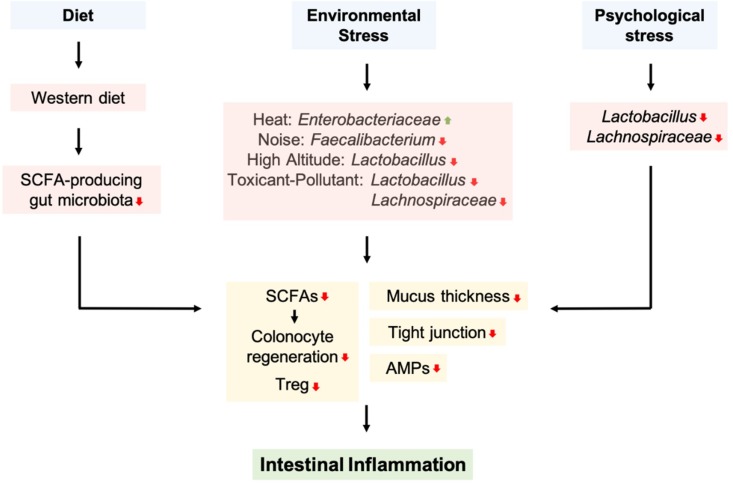
Source: ncbi.nlm.nih.gov
The problem isn’t just the number of pathogenic bacteria. Cell walls of gram-negative bacteria contain lipopolysaccharide (LPS), an endotoxin known to be a potent inducer of inflammation.
Under normal circumstances, LPS plays an important role in regulating the inflammatory responses in the gut towards pathogens. When coupled with a leaky gut, however, LPS can enter the bloodstream and interact with immune cells.
When that happens, immune cells mobilize to eliminate the LPS in a cascade of activities that eventually leads to tissue inflammation. The inflammation triggers even more immune cells, disrupting tissue homeostasis and creating chronic low-grade inflammation.
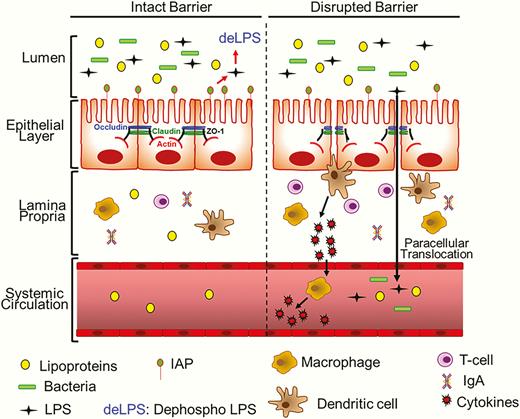
Source: academic.oup.com
Other Causes of Leaky Gut
So far we’ve discussed some of the main culprits of leaky gut. But it doesn’t end there.
Below is a list of foods and other factors that can cause inflammation in your body, while harming good bacteria, and promoting unhealthy ones. All factors that can contribute to leaky gut.
- Processed meats
- Wheat-based products
- Sugar and artificial sweeteners
- Snack foods like crackers, popcorn, etc.
- Junk food
- Commercial sauces
- Refined oils
- Dairy products
- Alcohol
- Sugary and/or carbonated beverages
- Industrial seed oils
- Stress
- Yeast overgrowth
- Use of NSAIDs
- Nutrient deficiencies
Eating to Heal Leaky Gut: The Carnivore Diet
What’s the first thing that comes to your mind when you think of the phrase “apex predator”? For many, it might be a shark, a lion, or a wolf.
But new research suggests that humans were on that list for nearly 2 million years. Our ancestors were “morphologically and behaviorally adapted to carnivory,” specializing in hunting massive prey called megafauna.
The switch to a more omnivorous diet occurred only about 11,000 years ago, right around the time of the agricultural revolution.
There’s no question that humans are omnivores–meaning we can get energy from both meat and non-meat foods. But like wolves, our ancestors were facultative carnivores. This means we specialized in eating nutrient-dense meat, and only resorted to plants when we had to. I.e. when we were starving.
Returning to this ancestral way of eating may heal dysbiosis and leaky gut syndrome. In essence, the leaky gut diet is how we evolved to eat. It works by limiting and eliminating potential toxins. While at the same time a leaky gut diet provides the gut with the most bioavailable nutrients on earth–all found in meat. More on this below.
Benefits of the Carnivore Diet
Most people are unfamiliar with the carnivore diet. Though an ancient way of eating, it’s new to the diet world. So when determining at the benefits of a carnivore diet, we rely on decades of research on its close cousin, the ketogenic (keto) diet.
A well-formulated carnivore diet may lead to:
- Weight loss
- Reduced inflammation
- Improved gut health
- Improved insulin sensitivity
- Mental clarity
What Can You Eat on The Carnivore Diet?
As the name implies, on a carnivore diet you eat exclusively animal products. Note that it’s not just about meat, though and certain types of carnivore diets are more restrictive than others.
Food allowed on the carnivore diet include:
- Muscle meat (fatty cuts)
- Organ meat
- Eggs
- Seafood
- Fats
- Bone broth
- A2 dairy
- Salt, pepper, and some herbs
The Fiber Myth
You might have noticed something missing from the leaky gut diet list above: fiber-rich fruits and vegetables.
That’s because mainstream nutrition has misled us for decades to believe fiber is essential to a healthy diet. We’ve been told that without fiber to act as a “colonic broom,” we’d be at risk of developing health problems like constipation, high cholesterol, heart disease, etc.
But more recent research has revealed that fiber is not the panacea it’s been made out to be.
In fact, consuming large amounts of fiber can be harmful.
One study found that women who ate a high fiber diet had lower hormone concentrations and a higher chance of anovulation, a common cause of infertility.
Another review of previous studies found little to no support for a protective role of fiber against colorectal diseases.
On a leaky gut diet, Dr. Kiltz recommends cutting your insoluble fiber intake as much as possible. Any fiber you consume should be from whole-food sources.
There is evidence that eliminating all-fiber may be beneficial in the short term, it may be necessary to reintroduce soluble fiber. In this case, potatoes and sweet potatoes are a good option.
Why The Carnivore Diet Improves Gut Health
A well-formulated, nutrient-dense carnivore diet removes many toxins and inflammatory foods found in the standard American diet. At the same time, it maximizes healing by providing your body with the most nutrient-dense food in existence.
Think about it. Your cells are starving for proper nutrients, and an inflamed gut is harder for them to get the nutrients they need.
This is why high-fat, low-carb keto diets have been used successfully for patients with inflammatory conditions. Lift the toxicity burden, feed your cells, and you’ll see a dramatic decrease in inflammation.
In particular, organ meats are jam-packed with both fat-soluble and water-soluble vitamins, which have been shown to be critical to gut health.
Just a few weeks on a vitamin A-deficient diet is enough to cause changes within your gut bacteria that impair the intestinal barrier. Vitamin D deficiency could also compromise the barrier, which may be why it’s associated with inflammatory bowel disease.
Eating organ meats can quickly and completely reverse these deficiencies. For example, just 3.5 ounces of beef liver provides 4,968 µg of vitamin A, easily meeting the recommended daily intake. And carnivore foods like pastured lard and salmon roe are a fantastic source of vitamin D.
Some amino acids also play key roles in gut health. Glutamine, found in eggs and beef, regulates tight junctions and prevents permeability to toxins.
And don’t forget about bone broth! The collagen in bone broth provides amino acids that work to mend damaged intestinal lining, reducing the “leakiness.”
Goodbye, leaky gut!
Intermittent Fasting for Leaky Gut
Let’s consider the fact that the world’s first supermarket opened in 1916, and electric refrigerators entered mass market production just two years later.
This means the overabundance and constant availability of food has only been available to humans for just over 100 years, a mere blip in human evolution.
And this is not without consequences.
Our ancestors evolved in environments where food availability was sporadic. They would often go for days or more without food. When and if they were successful on a hunt, they would feast.
Today the recreation of this cycle of feasting and fasting is known as intermittent fasting.
Natural selection favored our ancestors who were capable of outperforming their competitors, cognitively and physically, while in a fasting state.
Some researchers argue that the advanced cognitive abilities of the human brain originally evolved to meet the challenges of food acquisition. And the removal of such a challenge may account for the ~10% reduction in human brain volume since the agricultural revolution.
Benefits of Intermittent Fasting for Gut Health
Intermittent fasting can be a powerful addition to your leaky gut diet.
Our cells and organ systems become complacent when they are not subjected to metabolic challenges.
Sadly, the modern lifestyle is plagued with constantly and excessively eating highly processed, high-carb foods. It’s no wonder that inflammatory conditions like obesity, leaky gut, and heart disease are skyrocketing. Especially in many parts of the world where a sedentary lifestyle and a poor diet have become the norm.
Mimicking our ancestors’ way of eating can help reduce chronic inflammation in your body, including in your gut. Certain intermittent fasting methods may help improve gut barrier integrity and gut microbiome compositions, preventing leaky gut.
Another — perhaps more obvious — benefit to intermittent fasting is that it gives your gut a break.
Your gut is not designed to be digesting all day every day. So letting the gut rest may be especially important for people with leaky gut. Not having to spend its energy digesting food may help your gut expend its tremendous energy needs on healing itself.
In an animal study, researchers showed that fasting can increase stem cell functions that help regenerate the intestinal lining.
Other Changes to Heal Leaky Gut
Here are some additional ways to improve your overall gut health:
- Take immunoglobulin supplements that bind to viruses, bacteria, and toxins, helping your body eliminate them before they damage your gut lining.
- Take a zinc carnosine supplement: Zinc carnosine can helep stabilize gut lining.
- Reduce stress: Chronic stress can increase gut permeability and cause negative changes to your gut bacteria. Try mindfulness exercises, breathing techniques, or yoga.
- Reduce alcohol consumption: Excessive alcohol intake can cause changes in the intestinal microbiome and breakdown of the intestinal barrier.
- Get more sleep: Lack of sleep can increase the risk of a leaky gut inducing dysbiosis. These bedtime yoga poses can help.
- Don’t smoke: Smoking can increase inflammation in your digestive tract. Quitting can increase the population of healthy gut bacteria.
- Use alternatives to NSAIDs and Aspirin: Studies have linked the use of non-steroidal anti-inflammatory drugs (NSAIDs) to intestinal barrier impairment and alterations in the gut microbiota.
- Avoid over-exercising: The stress of heat and oxidative damage during high-intensity exercise can damage the tight junction proteins. Try to stick with regular moderate-intensity exercises, which can reduce inflammation. Walking, stretching, swimming, and bicycling are all great options.
Leaky Gut Diet: Outlook
Leaky gut syndrome is a condition caused by increased gaps in the intestinal barrier that make it easier for toxins and bacteria to pass through into your bloodstream.
While leaky gut is not widely recognized as an official medical condition, evidence of leaky gut as a symptom of and contributor to many chronic diseases continues to mount.
If you are experiencing symptoms associated with increased intestinal permeability, there are a number of dietary and lifestyle changes that can help.
First and foremost is a leaky gut diet. Though some nutritionists and doctors may recommend a diet high in vegetables and fiber, this may exacerbate dysbiosis in your gut. It will also increase your intake of potentially irritating plant toxins and antinutrients.
An alternative and potentially more effective leaky gut diet is based around muscle meat, organ meats, and healthy fats loaded with bioavailable nutrients.
One way to dramatically rebalance your gut is to practice a carnivore diet. Though based on ancestral ways of eating, it’s new to the world of nutrition. This means there haven’t been clinical studies assessing its benefits. However, we do know from decades of research on the keto diet that a high-fat, moderate protein and low-carb diet are effective in the short term for rebalancing the microbiome and reducing inflammation.
Combining keto and carnivore diets with intermittent fasting can activate cellular renewal, give your gut time and energy to heal while replenishing it with the nutrients it needs.




















